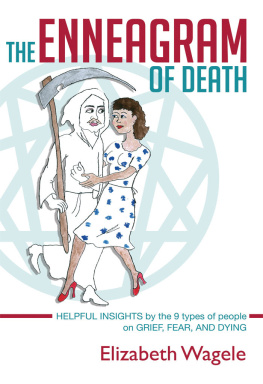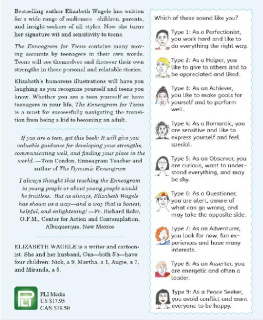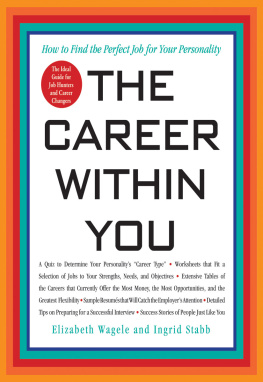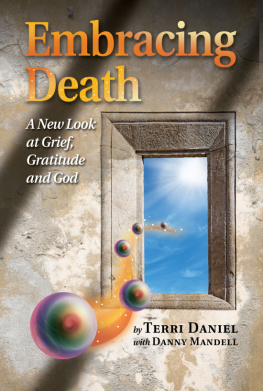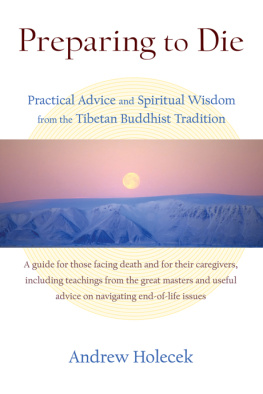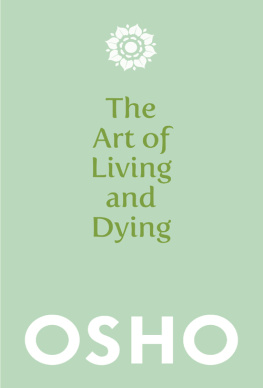The Enneagram of Death
The Enneagram of Death

Helpful insights by nine types of people
on grief, fear and dying
Elizabeth Wagele
Copyright 2012 by Elizabeth Wagele
All rights reserved
ISBN 13: 978-1530712038
ISBM: 10: 1530712033
First Edition
Cover Design: Laura Waters
Book Design: CJ Fitzsimons
Carol Leavenworths story Going down to visit the crocodile is reprinted by permission of Inside Aging Parent Care blog (edited):
http://www.desperatecaregivers.com/
Dahs poem is reprinted by permission of the author. It was first published on Page 12 In Forbidden Language, Stillpoint Publishing, Spokane WA 2010
She laughed in the concentration camp is based on Elizabeth Wageles November 2010 Psychology Today blog, The Career Within You.
Assisted Death in Chapter 5 is based on E. Wageles review in the Enneagram Educator, 1997, of Un Coeur en Hiver, directed by Claude Sautet.
Every effort has been made to trace copyright holders and to obtain their permission for the use of copyright material. The publisher apologizes for any errors or omissions and would be grateful for any correction that should be incorporated in future editions of this book.
Secrets of the Estate
By Tom Clark
Death may be the side of lifes mansion
Thats always been turned away from us
But that hasnt kept us, now and then,
From sneaking around to the other side
Where tall weeds grow over the broken statues,
And peeking in the windows.
From Paradise Resisted, selected poems 1978-1984
Black Sparrow Press, Santa Barbara 1984
The fundamental fact about all of us is that were alive for a while but will die before long. This fact is the real root cause of all our anger and pain and despair.
And you can either run from this fact or, by way of love, you can embrace it.
From Jonathan Franzen, Liking Is for Cowards. Go for What Hurts May 28, 2011, New York Times
Contents
Katy Taylor
Jan Conlon
Knute Fisher
Elizabeth Wagele
Santikaro
James Campbell
Russell Burck
Dr. Elayne Savage
Elli Boray
Elizabeth Wagele
as told to Elizabeth Wagele
Elizabeth Wagele
Darlene Yarnelle
Tom Alexander
Manny Glaser
Hope Hosier
Connie Frecker
Lee Estridge
Jeanne St. John
Pat Helin
Morgan Silas
Carol Leavenworth
Susanne Arcand-Gawreluk
Elizabeth Wagele
Rock Ross
Janet Hartzell
Courtney Behm
Dr. James Campbell
Jayne Johnson
Charlotte Melleno
Jaki Girdner and Joan Degiorgio.
Dave Scherman
David Brooks
Tom L. Clark
Elizabeth Wagele
Elizabeth Wagele
Elizabeth Wagele
Michele Harrison
Dave Hall
Shelley Berman
Georgia Bailey
Mario Sikora
Marilyn Margulius
Samantha Mercer
Tom Purcell
Kathy Heuser
Kathy Heuser
Catherine Williams
John Stabb
Jaki Girdner
Poem by Dah
Elizabeth Wagele
Pat Helin
Valentine Illidge
Harriet Berman Glaser
Vicki Zenoff
Helen Clarkson
Mario Sikora
Jan Conlon
Pat Helin
Judy Meyer
Elizabeth Wagele
Tom Rosin
Elizabeth Wagele
Jaki Girdner
Mary Bast
Tom Purcell
Tom Rosin
Dr. Jim Campbell
Elizabeth Wagele
Tom Rosin
James Campbell
Jill Fanning
Bertha Reilly
Joyce Dowling
Preface
The purpose of this book is to soothe and inspire anyone who is dying or close to someone who is dying, or grieving, or afraid of death.
The key to becoming less frightened of death is to let yourself feel deeply. While its practical at times for some feelings to remain unexpressed, more often than necessary they remain hidden in the unconscious. One tool for enhancing your awareness of these repressed feelings is a system of personality built around nine types of people, the Enneagram. Each chapter of The Enneagram of Death features stories, poems, and essays I have chosen and lightly edited about one of these Enneagram types.
Many of us are afraid of our own demise and the loss of loved ones, though some of us may not realize it because we avoid thinking about the end of life. But neither fear nor avoidance changes deaths reality. A third relationship to death, however, exemplified in many of the contributions in this book, is to engage with it to the extent we overcome the fear. Then a precious new beginning is possible and we can release the energy previously held back by fear.
Why are these stories organized around the Enneagram personality system and not another, for example the respected MBTITM (Myers Briggs Typology Inventory)? Because these nine personalities are archetypes and they are immediately accessible to our emotions. Were all familiar with characters such as the powerful Asserter, the skeptical Questioner, and the ever-harmonizing Helper.
Youll distinguish how people with characteristics similar to and different from yours cope with their fear of death, the prospect of their own death, the shock of a loved ones death, end-of-life care giving situations, near death experiences, and more. Youll see how some other cultures deal with death. Youll especially resonate with your own type. The Enneagram of Death is an individualized way of looking at death and dying. Stories of types different from yours will offer you new perspectives.
Experiencing these stories offers an opportunity to uncover some of your previously unacknowledged cache of feelings; you can use the passion stored there to power the process of liberation. When you lose fear, life, vitality, and joy rush in to fill the gap.
The stories in this book may awaken your own unknown. I hope these stories and the Enneagram system will provide you with tools, models, soothing, and inspiration for what you are dealing with.

From defenses to authenticity
Its possible you unknowingly delay, camouflage, or deny your deepest feelings when consumed by fear of death or shocked by grief. These defenses are often necessary, yet sometimes they signify trouble. Some signs you may be resisting your true feelings are:
spacing out (taking drugs, excessive drinking, eating, TV, etc., so as to not feel anything),
restlessness of the mind (distracting oneself by excessive worrying, fretting, pessimism, or inner torment), and
excessive doing (keeping busy to avoid pain).
Some of these stories may open your heart and inspire you directly, while others may give you the door to your emotional center by showing how your defenses operate. You learn from those who didnt conquer their fear as well as from those who did.
When you become aware of your defense mechanisms (see the , below), you can change direction by centering yourself and making room for your true feelings to flower. Authentic feelings take time to emerge out of the murkiness, symbolized by the lotus rising out of the mud.

More about the Nine Personalities
The Enneagram personality system can increase your ability to observe yourself. It can also teach you to identify defenses you use along with strengths and strategies to keep your balance. Please read the sections
Next page
